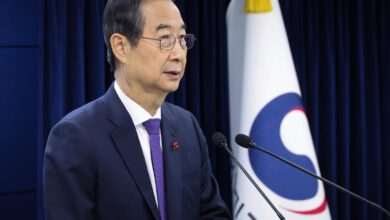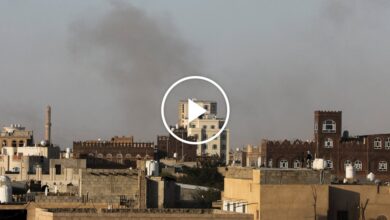The War in Syria Has a New Map. Again.

Sources: Institute for the Study of War and AEI’s Critical Threats Project (areas of control as of Dec. 5); Janes (rebel control as of November)
In just over a week, Syrian rebel forces have seized much of Syria’s northwest from the government in a fast-moving attack, upending the once-stagnant civil war. After capturing most of the major city of Aleppo, its airport, military bases and many towns and villages, on Thursday they drove government troops from the western city of Hama, which had never before fallen into rebel hands.
The offensive comes after a period of relative, if brittle, calm. Since 2020, the territorial map had stayed largely frozen: President Bashar al-Assad’s government dominated much of the country, while an array of other factions held different fragments of the rest.
Here’s who is fighting whom in Syria’s nearly 14-year-old civil war:
Opposition forces
Source: The Carter Center. Note: Opposition forces include both extremist Islamic and moderate factions.
The war erupted in 2011 after Mr. al-Assad brutally crushed antigovernment protests. In the early stages, rebels — who included both extremist Islamist and moderate factions — managed to take most of the country’s northwest and expanded into other territory. By 2014, they controlled not only their stronghold in the northwest, but also areas north of Hama, east of Damascus and in the southeast, near the Israeli border, as well as villages along the Euphrates and in al-Hasakah province, in Syria’s far northeast.
Then came the rise of the Islamic State in 2014 and Russia’s decision the following year to give Mr. al-Assad military support. The Islamic State expanded its so-called caliphate into northeastern Syria, while overpowering Russian airstrikes forced the rebel groups that had been battling Mr. al-Assad since 2011 to retreat. By this year, those opposition forces held nothing but a patch of the northwest until their latest offensive began last week.
Government forces and allies
Source: The Carter Center
Despite initial rebel successes, pro-Assad forces — including not only Syria’s military but also fighters sent by Iran and the Iran-backed Lebanese militia Hezbollah — were able to retake more territory over the last decade after a series of events shifted the conflict in their favor. Pro-government troops recaptured Aleppo with the help of Russian airstrikes after a four-year battle ending in 2016. The next year, a government offensive against the Islamic State put Mr. al-Assad back in control of many towns along the Euphrates River. And his forces’ advance on northwestern Syria in 2019 and 2020 cornered opposition forces in Idlib Province, bringing the conflict to an impasse that lasted until a week ago.
Islamic State
Source: The Carter Center
Syria’s civil war, along with growing instability in Iraq, allowed an ambitious Al Qaeda offshoot called the Islamic State to mushroom rapidly across both countries in 2013 and 2014. Fueled by a bloody, ultra-extremist interpretation of Islam, it conquered an expanse of territory in Syria and Iraq that it ruled as a so-called caliphate. At its height in 2015, the group held a third of Syria and about 40 percent of Iraq, with the northern Syrian city of Raqqa as its capital.
But a Western coalition led by the United States targeted the group with thousands of airstrikes, and U.S.-backed Kurdish-led forces eventually routed the Islamic State in much of northeastern Syria. Pro-Assad forces also pushed the group back in other areas, while the Iraqi army battled it in Iraq. By 2018, it had lost all but tiny shreds of its territory.
Kurdish-led forces
Source: The Carter Center
Forces from Syria’s Kurdish ethnic minority became the United States’ main local partner in the fight against the Islamic State. After the extremist group was defeated in large parts of the country, the Kurdish-led forces consolidated control over towns in the northeast, expanding an autonomous region they had built there, and along the Euphrates. But despite routing the Islamic State, Kurdish fighters still had to contend with their longtime enemy across the border, Turkey, which regards them as linked to a Kurdish separatist insurgency.
In 2019, President Donald J. Trump pulled American troops away from northern Syria, abandoning the Kurdish-led forces and opening the door for Turkish forces to oust them from areas along the northern border. Looking for protection against Turkey, the Kurdish-led forces turned to Damascus, allowing Mr. al-Assad’s forces to return to parts of northern Syria, where they have co-existed since. The Kurds still control much of northeastern Syria.
Turkish military operations
Source: The Carter Center
Since the beginning of the civil war, the Turkish military has launched several military interventions across the border into Syria, mostly against Syrian Kurdish-led forces, whom Turkey views as linked to what it calls a terrorist separatist movement in Turkey, the Kurdistan Workers’ Party, or P.K.K. Three Turkish operations – in 2016-2017, 2018 and 2019 – were aimed at taking control of towns and villages the Kurdish-led fighters had previously held along the northern border. Turkey now effectively controls that zone, where it provides public services and where its currency is routinely used.






